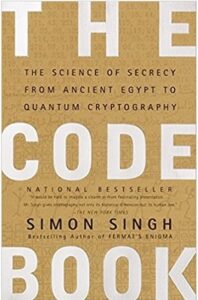Review By JoAnna Parker Martin
As long as there has been communication, there have been efforts to keep communication secret. “The Code Book” by Simon Singh is a fascinating journey through the history of cryptography, the science of secret communication. The book covers the evolution of codes and ciphers, from the ancient Greek scytale to modern-day public key encryption, and everything in between. As he says early in his intro, “History is punctuated with codes. They have decided the outcomes of battles and led to the deaths of kings and queens.” This topic is far more important to history than many people are aware of and this is the driving force behind his decision to write about it.
Singh dives deep as he takes readers on a captivating journey through the evolution of cryptography. Drawing on a wealth of historical anecdotes and technical explanations, Singh skillfully explores the relationship between codes and ciphers, and the personalities that created them, broke them, and shaped them again. What I loved about Singh’s book is his ability to make multiple complex concepts fairly accessible to a general audience. And if it does at times get dry, he weaves it back together with stories of famous cryptographers and codebreakers throughout history, such as Mary Queen of Scots, Charles Babbage, Alan Turing, and even Edgar Alan Poe! I would have loved to read more about some of the historical figures he covers, but helpfully there are additional reading suggestions at the end.
Further in the book, Singh also explores the ethical implications of cryptography, delving into the debate between privacy and security and discussing the role cryptography has played in protecting civil liberties. He runs through some personalities you may only be familiar with by name when cryptography is mentioned, from Diffie, Hellman, and Merkle to Phil Zimmerman the developer of Pretty Good Privacy (aka PGP). There is also a nice primer on the challenges of quantum cryptography and possible post-quantum communications solutions. For those less interested in how encryption works, it is quite easy to skip around and enjoy the juicy bits throughout the book.
In essence, “The Code Book” is not just a fascinating historical account of the pivotal role cryptography has played in wars, espionage, and technology but also a thoughtful reflection on the tension between privacy and security in the modern world. This book is relevant and timely to our profession, as well as highly entertaining. Frankly, it is not what I would call light reading. Nonetheless, I had a blast reading it.
